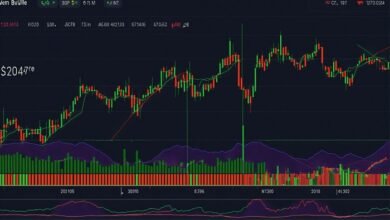How to Invest in Index Funds: A Comprehensive Guide

Investing in index funds has gained massive popularity among individual investors due to its simplicity, cost-effectiveness, and reliable returns over the long term. This blog will guide you step-by-step on how to invest in index funds, covering everything you need to know to start building wealth through this powerful investment strategy.
What Ar e Index Funds?
Index funds are mutual funds or exchange-traded funds (ETFs) designed to replicate the performance of a specific market index, such as the S&P 500 or the Nasdaq 100. They aim to match the returns of the index by holding the same securities in the same proportions.
When learning how to invest in index funds, understanding their structure is critical. Index funds offer diversification because they hold a wide range of stocks or bonds, reducing individual risk. Their passive management approach makes them less expensive compared to actively managed funds.
Why Should You Invest in Index Funds?
Understanding why to invest in index funds helps solidify your decision to make them a part of your portfolio. These funds are known for their low expense ratios, broad market exposure, and potential for long-term growth. Unlike actively managed funds, index funds eliminate the risk of poor fund management.
Additionally, index funds align well with the goals of beginner and seasoned investors alike. If you are wondering how to invest in index funds effectively, remember that their simplicity and performance make them ideal for hands-off investing.
Determine Your Financial Goals
Before diving into how to invest in index funds, it is essential to define your financial goals. Are you saving for retirement, a home, or your children’s education? Having clear objectives will help you choose the right index funds for your needs.
For example, if you’re investing for retirement, you might prefer a broad market index fund like the S&P 500. Understanding your timeline and risk tolerance is another crucial step in learning how to invest in index funds.
Choose the Right Index Fund
Choosing the right fund is pivotal when figuring out how to invest in index funds. Popular options include stock index funds, bond index funds, and international index funds. Each category serves a different purpose and risk level.
For beginners, broad-market index funds such as those tracking the S&P 500 or Total Stock Market Index can provide a solid foundation. Researching expense ratios, historical performance, and fund objectives will help you narrow down your options.
Open an Investment Account
Opening the right account is a fundamental step in learning how to invest in index funds. You can opt for a brokerage account, retirement account, or robo-advisor platform depending on your financial goals.
If you’re a hands-on investor, a brokerage account offers maximum flexibility. If you’re saving for retirement, accounts like IRAs provide tax advantages. Knowing how to invest in index funds involves understanding the best platform for your specific situation.
Start Investing in Your Chosen Index Fund
Once your investment account is set up, the next step in how to invest in index funds is to make your first purchase. Decide how much money you want to invest initially and consider setting up an automatic investment plan to contribute regularly.
Diversification is key when learning how to invest in index funds. Start small but stay consistent. Reinvest dividends to maximize compound growth over time. Most importantly, stick to your plan regardless of market fluctuations.
Monitor and Rebalance Your Portfolio
Monitoring and rebalancing your portfolio ensures that your investments align with your goals over time. Knowing how to invest in index funds includes understanding that periodic adjustments are necessary.
For example, if one index fund outperforms others, it might skew your asset allocation. Rebalancing involves selling some of the overperforming assets and investing in underperforming ones to maintain your target allocation. This step is crucial for optimizing returns and managing risk.
Benefits of Investing in Index Funds
The benefits of learning how to invest in index funds go beyond simplicity. These funds are tax-efficient, cost-effective, and highly diversified. They’re ideal for investors who prefer a low-maintenance approach.
Moreover, index funds historically outperform most actively managed funds over the long term. If you’re researching how to invest in index funds, you’ll find that their ability to deliver consistent returns makes them a reliable choice for achieving financial independence.
Common Mistakes to Avoid When Investing in Index Funds
Learning how to invest in index funds also involves understanding common pitfalls. Avoid chasing high returns or over-concentrating your investments in a single sector. Stick to low-cost funds and focus on your long-term goals.
Another mistake is failing to monitor expense ratios. While index funds are generally cost-effective, some have higher fees than others. Being mindful of these details ensures a successful journey in learning how to invest in index funds.
Conclusion
Investing in index funds is one of the simplest and most effective ways to grow your wealth. By following these steps on how to invest in index funds, you can create a diversified portfolio tailored to your financial goals. Remember to stay disciplined, rebalance as needed, and focus on the long-term benefits of this proven investment strategy.
FAQs
1. What is the minimum amount required to invest in index funds? The minimum amount varies depending on the fund and platform. Some funds require as little as $1, while others may need $1,000 or more.
2. Are index funds safe investments? While no investment is entirely risk-free, index funds are considered safer due to their diversification and low volatility compared to individual stocks.
3. Can I lose money in index funds? Yes, index funds can lose value during market downturns. However, their diversified nature typically mitigates the risk over the long term.
4. How do I choose the best index fund for my portfolio? Consider factors like expense ratio, historical performance, fund objectives, and your financial goals when selecting an index fund.
5. Is it better to invest in index funds or ETFs? Both have their advantages. ETFs offer flexibility and lower investment minimums, while index mutual funds are better for automatic investing.




